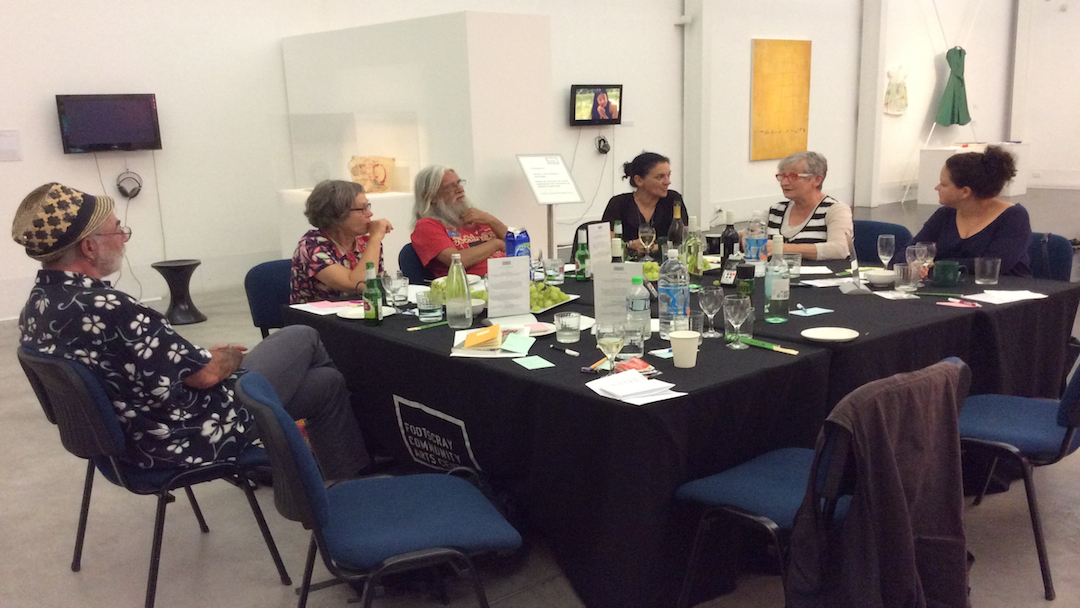Melbourne Dinner
Date: 3 March 2014
Location: Footscray Community Arts Centre, 45 Moreland St, Footscray VIC 3011, Australia
Guests: Jon Hawkes, Robin Laurie, Uncle Larry Walsh, Heather Horrocks and Fotis Kapetopoulos
Co-hosts: Marnie Badham (VCA) and Bern Fitzgerald (Footscray)
Food: Thai takeaway, fruits
The 1984 dinner in Melbourne took place on 3 March 2014 and was co-hosted by Bern Fitzgerald at Footscray Community Arts Centre and Marnie Badham based in the Centre for Creative Partnerships, VCA. Our guests were Jon Hawkes, Heather Horrocks, Robin Laurie, Uncle Larry Walsh and Fotis Kapetopoulos.
We held the dinner in the gallery space at Footscray, and ate a lot of Vietnamese food. The guests spoke of the relationship between art and politics at the time, including the fights against terms such as ‘community arts’ and ‘multiculturalism’, the importance of support and friendship between people, the rise and rise of bureaucracy and contradictions with indigenous ways of organising.
Read the contextual notes for more information about Melbourne in 1984.
Listen to the Melbourne Dinner
Total running time: 1:26:19
- Introductions (14:10) Listen Uncle Larry acknowledges the traditional owners of the land and everyone introduces themselves and says something about what they were doing in 1984.
- International Influences (5:56) Listen Robin talks about the influence of Philippine theatre practitioners who described themselves as ATORs (Actors, Teachers, Organisors and Researchers), Paulo Freire, the different cultures in Footscray, their tour to the USA in the 1970s, Chileans in Sydney, liberation theology, the arrest of Brian Gore. Uncle Larry reflects on East Timor. Jon talks about the magpie-like ways Australians borrow from other cultures.
- Working from the inside (2:58) Listen Jon talks about his work on the Community Arts Board, and going ferrel
- Victorian Aboriginal Art (3:38) Listen Uncle Larry on the funding of contemporary Aboriginal urban art, artists identifying as Aboriginal and as urban, and the issue with dot painting.
- Knowing the history (1:47) Listen Robin talks about the importance of reading about histories of art and politics in 20th Century and Jon flags up Gay Hawkins’ publication From Nimbi to MardiGras.
- Community arts as radical arts (3:08) Listen Jon reflects on what community arts meant to him at the time and Fotis talks about his passion to destroy community art.
- Locating the politics (4:37) Listen Uncle Larry talks about how politics is now used as a way of negotiating with each other, rather than the main message; Jon reflects on how they saw every move they made as being inherently political at the time; Robin remembers being asked by political groups to provide ‘colour and movement’.
- Art, Change and Socialising (4:49) Listen The group talk about the relationship between art, change and conservation, spreading the word and the social aspects of art that involves people.
- Money (7:45) Listen The group discuss the politics of funding in the 1980s, who and what got funding and who and what didn’t and experiences of living on the dole and working whilst being an activist.
- Professionalisation (7:08) Listen the group discuss the implications of the professionalisation of art and in particular community arts.
- Embarrassing bureaucracies (3:27) Listen Uncle Larry reflects on how the bureaucratic structure was not the one the aboriginal cultures lived with.
- The Intangible (1:58) Listen Fotis and Uncle Larry talk about the importance of lay folklorists and storytellers and intangible cultural heritage and the lack of support for oral traditions in Australia.
- Anger (3:44) Listen The group reflect on if and why they were angry in the 1980s and the significance of humour
- Consumerism and Despair (1:57) Listen Uncle Larry and Robin discuss being treated as a customer in community arts centres and the despair that comes from consumerism.
- Wogs out of Work (6:33) Listen Fotis talks about his experience as an ‘empowered wog’ and how he wanted to be seen as a mainstream artist not a multicultural artist.
- Stirring Songs in Many Tongues (4:36) Listen Robin talks about the way they worked with dialect, reclaiming Australian vernacular from oppressive presence of BBC English; Fotis talks about the need to seek diverse audiences.
- Being openly critical (3:11) Listen The group talk about how it was easier to speak out and be critical in the 1980s and that people don’t tend to do this so much now as they are so dependent on arts funding.
- Friendships (3:19) Listen The group shared stories of being part of a tribe, being socialised, working with friends; getting the message out there; that it was a struggle, but that it was also fun; Heather talks about the role of craft.
- Endings (1:30) Listen Final remarks.


